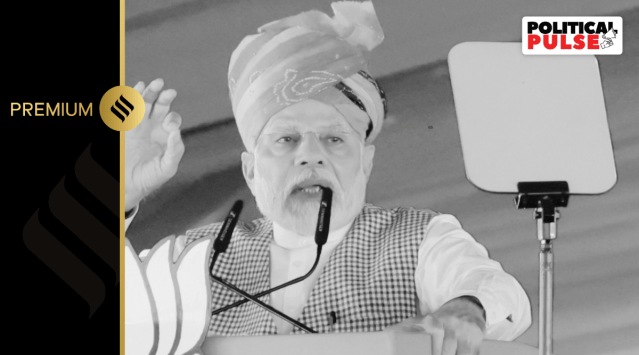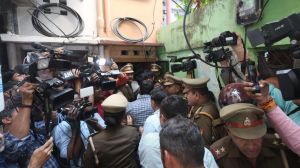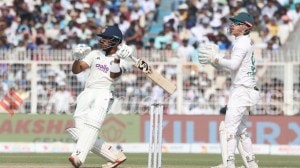ADDRESSING a rally in poll-bound Telangana on Tuesday, Prime Minister Narendra Modi for the first time waded into the looming issue of delimitation, due in 2026, choosing a southern state to do so.
With several leaders in the South expressing concern that delimitation based on population might lead to a fall in their representation in Parliament, Modi took the topic head-on, observing that the South “stands to lose 100 seats”, and making the same about the position taken by the Congress.

Speaking in Nizamabad, Modi used the phrase “Jitni aabadi, utna haq”, first mentioned by Congress leader Rahul Gandhi in the recent Karnataka Assembly elections to press for a caste census, to make his point.
Story continues below this ad
“The country is now talking about the next delimitation. It will mean that wherever the population is less, the Lok Sabha seats will come down, and rise where the population is high… The southern states have achieved remarkable progress in population control, but will stand to lose heavily if the Congress’s new idea of rights in proportion to population is implemented… South India stands to lose 100 Lok Sabha seats… Will South India accept this? Will South India forgive the Congress? I want to tell Congress leaders not to fool the nation. Make it clear why they are playing this game,” Modi argued.
Asking both the INDIA alliance and Congress to “clarify if they are against South India”, the PM said: “I want to specify that this new thought (Jitni aabadi, utna haq) is injustice to southern India.”
While a politically fraught move, BJP sources said that it is well-planned by the PM, with the party preparing the ground, with time to spare, in a region where it has little to lose. The North remains the party’s conventional stronghold, and delimitation, it is safe to presume, means gains for the BJP there.
 Sources: Census documents
Sources: Census documents
(Express graphic)
Plus, this is a bitter pill that has to be swallowed at some time by all parties – and Modi might have thrown down the gauntlet for the Congress to do so. Plus, he has done so using a Rahul phrase and the Congress call for caste census, thus felling two birds with one stone.
Story continues below this ad
The Opposition’s caste census clamour, primarily to cut into the BJP’s hold on the OBCs, anyway may have lesser traction in the South where intermediate castes control the levers of power in most states.
BJP sources are also reading in Modi’s speech a message to party leaders on how to frame the delimitation issue, without overlooking the need to respect the regional balance of power.
Earlier, key Congress ally and Tamil Nadu Chief Minister M K Stalin termed the 2026 delimitation a “Sword of Damocles” hanging over the heads of the southern states, as they face the prospect of their numbers going down in Parliament. Other CMs too have raised similar concerns, asking whether the South was being “punished” for successfully controlling its population, and accomplishing population control targets set by the Centre itself.
The Finance Commission example
The 15th Finance Commission used the 2011 Census as the basis for devolution of money raised by the Centre in taxes, to states. The southern states have pointed out that a population-based criterion meant that their share in the devolution of taxes came down from 17.98% of the total in the 14th Finance Commission to 15.8% in the 15th.
Story continues below this ad
Accounting for 20% of the country’s population, the southern states contribute to 35% of its GDP, another source of their angst.
As per some estimates, the number of Lok Sabha seats in Uttar Pradesh – already the most dominant state politically – could go up by 80% (or 144 seats, compared to 80 now), while Kerala (20 seats) might not see any change and Tamil Nadu an increase of 10% (to 43, roughly, from 39 now).
Given the increase in Lok Sabha seats overall in the North, this essentially could mean lesser say for the South in matters decided at the Centre.
In 2001, when the then NDA government led by Atal Bihari Vajpayee had moved a Bill to freeze delimitation till 2026 in Parliament, then Law Minister Arun Jaitley had said that the rationale behind the move was the failure of some states to implement the family planning programme effectively, while others had done it.
Story continues below this ad
“The National Population Policy envisages the year 2026 as the year in which the population of the country would stabilise. Therefore, what was true till 2000 is sought to be frozen till the Year 2026, that is, the year in which we anticipate that the population figure in the country would stabilise hopefully,” he said.
The opposition Congress at the time expressed doubts over whether the country would be able to achieve its population targets by 2026. Then Leader of the Opposition Shivraj Patil said: “I find it very difficult to accept this optimism. In 1976, it was thought that the population may not increase… But population has increased… What is the guarantee that the population will remain where it is today? I find it very difficult to accept this logic.”
The Modi govt & delimitation
Former BJP Lok Sabha MP turned Congress leader Manvendra Singh, who represented his native Rajasthan in the delimitation committee set up by the Vajpayee government, said the then PM informally told the panel members that there was an unofficial agreement among parties to maintain the balance of power among states.
However, Manvendra Singh said, there is concern regarding the Modi government’s way of doing things. “Knowing how this government functions, it could bulldoze a Bill without considering the sentiments of southern states. And by every calculation, the net gainers would be states like Uttar Pradesh, Bihar, Madhya Pradesh, Rajasthan, etc where the BJP is a dominant player. That would be unacceptable,” he said.
Story continues below this ad
Among the MPs from the South who have raised this issue in Parliament is the DMK’s Kanimozhi N V N Somu. Speaking in the Rajya Sabha last year, in the context of devolution of Central funds, she said: “It is absolutely ridiculous and very unfair that states which have successfully implemented family planning are penalised, and states that are reckless are being incentivised.”
During the recent special session, while discussing ‘Parliamentary Journey of 75 years’, CPI(M) Lok Sabha MP from Kerala John Brittas said: “Kerala contributes Re 1 to the national kitty and gets back 25 paise.”
A senior BJP leader from the South said the Opposition’s fears are misplaced and that the party leadership was conscious of the challenges delimitation poses, the need to handle the same “sensitively”, as well as of the fact that the process itself can’t be dodged. “There are no two ways about it. Organising representation based on population is a constitutional process and the past governments have been deferring it. But it has to be taken up now,” the leader said.
Union Minister and BJP Rajya Sabha MP from Karnataka Rajeev Chandrasekhar said Modi’s Telangana speech had shone the spotlight on the deep contradictions and hypocrisy within the INDIA alliance.
Story continues below this ad
“On the one hand, Congres leader Rahul Gandhi is openly saying ‘Jitni aabadi, utna haq’, which means more seats for those states with higher population. And on other hand, his partner DMK is worried that southern states will lose seats. The Prime Minister has pointed out that if the country follows Rahul’s politics, then southern states will lose a hundred seats.”



 Sources: Census documents
Sources: Census documents




























